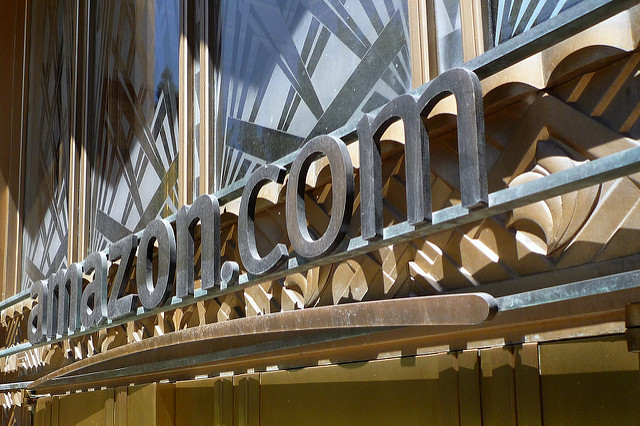Amazon’s Faster Shipping Hurting Its Earnings
It was a surprising quarter for Amazon (Nasdaq: AMZN). For the first time in more than two years, the company saw its earnings fall. The market was clearly not impressed, and the stock fell 7% in the post announcement trading.

Amazon’s Financials
Amazon’s third quarter revenues grew 24% to $69.98 billion, ahead of the market’s forecast of $68.83 billion. Net income of $2.1 billion, or $4.23 per share fell significantly compared with previous year’s $5.75 per share and previous quarter’s $5.22 per share. Earnings failed to meet the market’s expectations of $4.59 per share as well. The miss in earnings was attributed to the company’s continued push to roll out free-one day delivery.
By segment, net product sales increased 17% to $39.7 billion and net service sales increased 32% to $30.3 billion.
Within the e-commerce business, the domestic market generated net sales of $42.64 billion and an operating income of $1.28 billion, while international operations recorded an operating loss of $386 million on sales of $18.35 billion. Amazon’s brick-and-mortar retail offerings brought in $4.2 billion in revenues with net sales falling 1% over the year.
AWS revenues grew 35% to $9 billion, marginally shy of the market’s expectations of $9.1 billion.
Amazon plans to invest in faster shipping even for the holiday quarter. It is planning to invest $1.6 billion in one-day shipping this quarter, thus impacting its earnings outlook as well. For the holiday quarter, Amazon forecast net revenues of $80-$86.5 billion with operating income of $1.2-$2.9 billion. Analysts were projecting revenues of $87.39 billion with an operating profit of $4.19 billion.
Amazon’s Upgrades
During the quarter, Amazon introduced several new features for Alexa. It now has more than 85,000 smart home products from over 9,500 unique brands that can be controlled with Alexa. It announced new Alexa smart home features and products such as the Certified for Humans program that helps customers find smart home products that are simple to set up and use. It announced an integration with the Food Network Kitchen service to Amazon devices so that customers can watch Food Network episodes, get step-by-step cooking instructions, save recipes, ask questions, and take live and on-demand cooking classes with Food Network chefs using Echo Show. It also entered into an agreement with General Motors that allows for Alexa to be integrated into vehicles across the Chevrolet, Buick, GMC, and Cadillac vehicles. Amazon also expanded Alexa’s language capabilities and the service is now available in Portuguese for customers in Brazil, Spanish for customers in the U.S., and Hindi for customers in India.
Within Prime, Amazon continued to add content to its streaming service. For the third consecutive season, it allowed Prime members to live stream NFL Thursday Night Football games. It launched several local original series globally such as All or Nothing: Brazil National Football Team and Soltos em Floripa in Brazil; El Juego de las Llaves and Derbez Family Vacation in Mexico; The Family Man in India; and season three of The Bachelor in Japan to name a few.
Within the cloud, AWS also saw several new features. Recently, it announced the general availability of Amazon Forecast, a fully managed service that uses machine learning to deliver accurate forecasts for business conditions such as product demand and sales, infrastructure requirements, energy needs, and staffing levels. Amazon claims that its predictions are up to 50% more accurate than traditional methods.
Last week, Amazon announced the acquisition of healthcare startup Health Navigator for an undisclosed sum. Chicago-based Health Navigator was set up in 2014 by David Thompson. It is known in the healthcare sector for the development of the Schmitt-Thompson protocols that have become the norm for hospital staff to guide patients to the right place through call centers. The company provides several services such as symptom-checking tools that can help with remote diagnoses and helps patients determine whether they should stay home, see a doctor or go to the emergency room.
While Amazon continues to invest in one-day shipping, it is also looking at expanding its counter pick up service. Last week, it announced that it was partnering with GNC Holdings, Health Mart, and Stage Stores, to allow its customers to access locations of these stores for their order pickup. GNC has an estimated 8,000 stores in the country. Amazon had earlier entered into a similar agreement with RiteAid.
Amazon may be making the right moves, but the disappointing outlook for the holiday season and falling earnings are causes for concern.
My read is that it is bound to be very expensive to lay down the infrastructure for 1-day shipping at this scale. The market would need to be patient with Amazon for the benefits of this investment to start hitting its bottomline.
Its stock is trading at $1,780.78 with a market capitalization of $880.8 billion. It had touched a 52-week high of $2,035.80 in July this year. It hit a 52-week low of $1307 in December last year.
Sramana Mitra is the founder of One Million by One Million (1M/1M), a global virtual incubator that aims to help one million entrepreneurs ...
more



Typical heavy investment in itself in the future “look at us we didn’t make any earnings.” $AMZN.